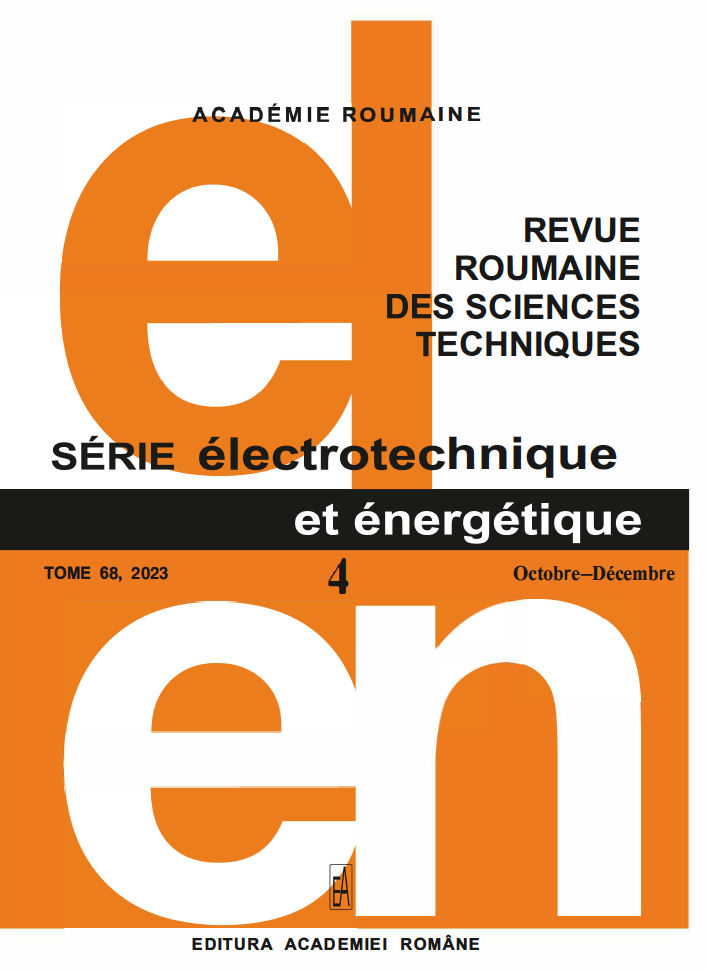SMART SYSTEM FOR STANDBY POWER CONSUMPTION REDUCTION OF HOUSEHOLD EQUIPMENT
DOI:
https://doi.org/10.59277/RRST-EE.2023.4.15Keywords:
Household equipment, Stand-by power consumption, Arduino system, Android, BluetoothAbstract
One of the characteristics of household equipment is that it also consumes power in standby mode, which can take considerable amounts over time. A smart system that can automatically cut off the equipment's power supply in standby mode must be important to reduce power consumption and financial expenses. To design the system, the power consumption in standby mode for 3 basic household equipment was first measured. In one month, the total energy consumption measured in standby mode was 28.31 kWh. Then, the system's functions, based on the Arduino Nano microcontroller, have the role of controlling a relay module status, which is given by the equipment’s consumed current. The system's control is done using an application developed for Android Operating System devices, which can be used to set the time delay current value and manually activate/disable the system. By implementing the proposed system on the 3 previously measured household equipment, the energy consumption on stand-by mode is reduced by 19.83 kWh per month.
References
(1) A. Vasiliu, O. Nedelcu, O. Magdun, I. C. Salisteanu, A study on the energy consumption of the electrical and electronic household and office equipment in standby and off-mode, The Scientific Bulletin of Electrical Engineering Faculty, 1, pp.26-30 (2021).
(2) S. M. Daragmeh, A.T. Karslen, I.A. Hameed, Heuristic Techniques for Reducing Energy Consumption of Household, ECMS (2022).
(3) S. Matsumoto, K. Mizobuchi, S. Managi, Household energy consumption, Environ. Econ. Policy Stud., 24, 1, pp. 1–5 (2022).
(4) R.J. Desiderio, P. Del Rio, Analysing the drivers of the efficiency of households in electricity consumption, Energy Policy, 164 (2022).
(5) Eurostat, Energy Consumption in Households (2020).
(6) H. Andrei, O. Marin, M. R. Ghita, T. Ivanovici, G. Nicolaescu, P.C. Andrei, Measurement data analysis of power quality and energy efficiency for residential loads sector, IEEE-International Conference on Power and Energy Systems (ICECPS), Hong-Kong, China (12-13 April 2012).
(7) K. Nikum, R. Saxena, A. Wagh, Power quality analysis of energy efficient residential load, IEEE International WIE Conference on Electrical and Computer Engineering (WIECON-ECE) (14 August, 2017).
(8) M. Maricaru, I.V. Nemoianu, R. Creţu, New solution of linear dc actuator with additional permanent magnets: working principle, design and testing, Rev. Roum. Sci. Techn. – Électrotechn. et Énerg., 59, 1, pp. 57–66 (2014).
(9) I. Şerban, C. Marinescu, Power quality issues in a stand-alone microgrid based on renewable energy, Rev. Roum. Sci. Techn. –Électrotechn. et Énerg., 53, 3, pp. 285–293 (2008).
(10) D. Villanueva, D. San-Facundo, E. Miguez-Garcia, A. Fernandez-Otero, Modeling and simulation of household appliances power consumption, Appl. Sci., 12, 7, p. 3689 (2022).
(11) P. Hubert, M. Gerber, A. Rumsch, A. Paice, Prediction of domestic appliances usage based on electrical consumption, Energy Informatics, 1, 16 (2018).
(12) D. Moldovan, A. Slowik, Energy consumption prediction of appliances using machine learning and multi-objective binary grey wolf optimization for feature selection, Applied Soft Computing, 111 (November 2021).
(13) R.K. Chauhan, K. Chaucan, A. Badar, Optimization of electrical energy waste in house using smart appliances management system – a case study, Journal of Building Engineering, 46, 2 (2021).
(14) T. Molla, B. Khan, B. Moges, H. Alhelou, R. Zamani, P. Siano, Integrated energy optimization of smart home appliances with cost-effective energy management system, CSEE Journal of Power and Energy Systems, 5, 2 (2019).
(15) M. Eirianki, I. Varlamis, J. Dahihande, A. Jaiswal, A.A. Pagar, A.T. Thakare, Real-time recommendations for energy-efficient appliance usage in households, Front Big Data (2022).
(16) Y.A. Himeur, F. Bensaali, A. Amira, C. Sardianos, I. Varlamis, G. Dimitrakopoulos, Achieving domestic energy efficiency using micro-moments and intelligent recommendations, IEEE Access, 8 (2020).
(17) J. Codispoti, A. R. Khamesi, N. Penn, S. Silvestri, E. Shin, Learning from non-experts: an interactive and adaptive learning approach for appliance recognition in smart homes, ACM Trans. Cyber Phys. Syst. 6, pp. 1–22 (2022).
(18) S. Mursid, H. Santaso, Analysis of the Effectiveness of the Utilization of Power Monitoring Devices in Reducing Electric Energy Consumption, Journal of Physics Conference, Series 1364 (2019).
(19) K.A. Rahman, A.M. Leman, F.M. Mubin, M.Z.M. Yusof, A. Harir, M.N.M. Salleh, Energy consumption analysis based on energy efficiency approach: a case of suburban area, MATEC Web Conf., 87 (2017).
(20) J.L. Reyna, M.V. Chester, Energy efficiency to reduce residential electricity and natural gas use under climate change, Nature Communications 8, 14916 (2017).
(21) F. Issi, O. Kaplan, The determination of load profiles and power consumptions of home appliances, Energies, 11, 3 (2018).
(22) P. Ajay-D-Vimal Raj, M. Sudhakaran, P.A. Raj, Estimation of standby power consumption for typical appliances, Journal of Engineering Science and Technology Review, 2, 1, (2009).
(23) A.C. Gheorghe, H. Andrei, E. Diaconu, Data measurement and modeling method of electrical parameters of basic household equipment, 14th International Conference on Electronics, Computers and Artificial Intelligence (ECAI) (2022).
(24) A.C. Gheorghe, I. Udroiu, E. Stan, Electricity Consumption Measurement System Using ESP32, The Scientific Bulletin of Electrical Engineering Faculty, 21, 2, pp. 23-26 (2021).
(25) ***Autodesk product description AutoCAD 3D. Available online: https://www.autodesk.com/solutions/3d-cad-software (accessed on 14 December 2022).
(26) ***Proteus getting started guide. Available online: https://labcenter.s3.amazonaws.com/downloads/Tutorials.pdf (accessed on 16 December 2022).
(27) D. Chians-Palacios, C. Vargas-Salgado, J. Aguila-Leon, E. Huardo-Perez, Arduino-based smart power meter: a low-cost approach for academic and research applications, Conference: INNODOCT (2020).
(28) H.E. Degha, F.Z. Laallam, A.O. Chaima, S.S. Maroua, Implementation of an energy monitoring system based on Arduino, Conference Artificial Intelligence and Its Applications (2019).
Downloads
Published
Issue
Section
License
Copyright (c) 2023 REVUE ROUMAINE DES SCIENCES TECHNIQUES — SÉRIE ÉLECTROTECHNIQUE ET ÉNERGÉTIQUE

This work is licensed under a Creative Commons Attribution-NonCommercial-NoDerivatives 4.0 International License.


